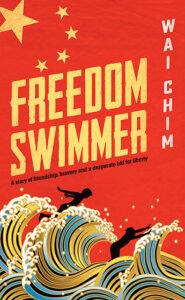Freedom Swimmer has just been released, and we are lucky enough to have some thoughts from Wai Chim, the author of this novel. Her discussion of ‘bad things’ resonates with us – books are a way to talk about all sorts of topics with young people. Thank you Wai Chim for writing this piece and the book.
 When I first told my father I was writing a book about his experiences growing up in China, he had some loving and protective fatherly words for me:
When I first told my father I was writing a book about his experiences growing up in China, he had some loving and protective fatherly words for me:
‘Should you be writing about something that’s bad?’
The idea that what I was writing was ‘bad’ is a result of the deep political minefield that comes with talking about the Cultural Revolution and Mao Zedong, especially in China.
For those who are unfamiliar, Mao Zedong was the former Chairman of the Chinese Communist Party and is often referred to as the ‘founder of modern China’. However, many of his policies were highly controversial – between 1958 and 1961, he pushed ‘The Great Leap Forward’, which was supposed to help China overtake the industrial productivity of the West, but instead resulted in a widespread and disastrous famine and the death of an estimated 45 million people – we’re talking almost double the population of Australia!
Meanwhile, from 1966 Mao launched the ‘Great Proletarian Cultural Revolution’ in an attempt to purge the government of his political enemies. Millions of youths, calling themselves Mao’s Red Guards, armed themselves with his Book of Quotations and physically attacked and abused those who were deemed ‘reactionaries’ and class enemies. The Cultural Revolution only really came to an end with Mao’s death in 1976.

Despite the tumultuous history and catastrophic events, the subject of Mao and his policies is still very much taboo in China, thanks to government censorship and control over the media. Just last year, a well-known Chinese reporter was taken off air for publicly criticising the former Chairman. So many people, including my father, have largely chosen not to discuss the matter and simply to put the past behind them – to not talk about the ‘bad things’.
The problem is that today not only are many Western countries left in the dark about these matters, many younger Chinese are also not aware of the immediate history and the suffering of their own parents and grandparents. In 2014, some Chinese university students were heavily criticised for their treatment of the Cultural Revolution as a joke, dressing up as Red Guards and denouncing their peers with dunce caps and violence. The scenes and images would have conjured strong feelings of dread and regret for those who lived through those times.
I certainly didn’t know anything about it growing up and to be honest, it wasn’t really until Yang Jishang published Tombstone: The Untold Story of Mao’s Great Famine that it really dawned on me that my own father had lived through these times. There were just so many ‘bad things’ that he and many others don’t want to talk about.
As an author, I’m hoping that through Freedom Swimmer, we can talk about the ‘bad things’ so that we can be honest and open, and most importantly respectful, of our varying cultures and heritages. Fiction and stories are a great way to explore controversial ideas and subject matters, even if they can be seen as taboo.
I wrote a story that talked about those ‘bad things’ my father was worried about. And I told him that I was incredibly lucky; that because he had decided to make the swim, to leave China and eventually move to the US, that because he chose to make that journey and take the risk so many years ago, I now had the freedom to write about those ‘bad things’. That was one of his many gifts to me – and I am eternally grateful.
Read our review of ‘Freedom Swimmer ‘ by Emily Clarke



